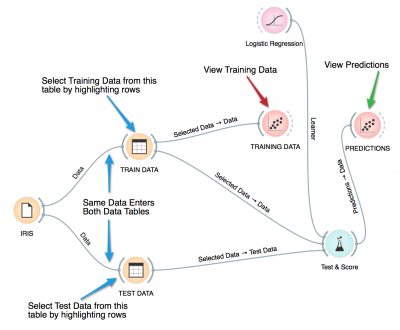Difference between revisions of "Orange: Logistic Regression"
Onnowpurbo (talk | contribs) (Created page with " center|400px|thumb") |
Onnowpurbo (talk | contribs) |
||
| Line 1: | Line 1: | ||
| + | Sumber: https://docs.biolab.si//3/visual-programming/widgets/model/logisticregression.html | ||
| + | |||
| + | |||
| + | The logistic regression classification algorithm with LASSO (L1) or ridge (L2) regularization. | ||
| + | |||
| + | Inputs | ||
| + | |||
| + | Data: input dataset | ||
| + | |||
| + | Preprocessor: preprocessing method(s) | ||
| + | |||
| + | Outputs | ||
| + | |||
| + | Learner: logistic regression learning algorithm | ||
| + | |||
| + | Model: trained model | ||
| + | |||
| + | Coefficients: logistic regression coefficients | ||
| + | |||
| + | Logistic Regression learns a Logistic Regression model from the data. It only works for classification tasks. | ||
| + | |||
| + | ../../_images/LogisticRegression-stamped.png | ||
| + | |||
| + | A name under which the learner appears in other widgets. The default name is “Logistic Regression”. | ||
| + | |||
| + | Regularization type (either L1 or L2). Set the cost strength (default is C=1). | ||
| + | |||
| + | Press Apply to commit changes. If Apply Automatically is ticked, changes will be communicated automatically. | ||
| + | |||
| + | Example | ||
| + | |||
| + | The widget is used just as any other widget for inducing a classifier. This is an example demonstrating prediction results with logistic regression on the hayes-roth dataset. We first load hayes-roth_learn in the File widget and pass the data to Logistic Regression. Then we pass the trained model to Predictions. | ||
| + | |||
| + | Now we want to predict class value on a new dataset. We load hayes-roth_test in the second File widget and connect it to Predictions. We can now observe class values predicted with Logistic Regression directly in Predictions. | ||
| + | |||
| + | ../../_images/LogisticRegression-classification.png | ||
| + | |||
[[File:OrangeLogisticRegression.png|center|400px|thumb]] | [[File:OrangeLogisticRegression.png|center|400px|thumb]] | ||
| + | |||
| + | |||
| + | ==Referensi== | ||
| + | |||
| + | * https://docs.biolab.si//3/visual-programming/widgets/model/logisticregression.html | ||
| + | |||
| + | ==Pranala Menarik== | ||
| + | |||
| + | * [[Orange]] | ||
Revision as of 20:53, 12 January 2020
Sumber: https://docs.biolab.si//3/visual-programming/widgets/model/logisticregression.html
The logistic regression classification algorithm with LASSO (L1) or ridge (L2) regularization.
Inputs
Data: input dataset
Preprocessor: preprocessing method(s)
Outputs
Learner: logistic regression learning algorithm
Model: trained model
Coefficients: logistic regression coefficients
Logistic Regression learns a Logistic Regression model from the data. It only works for classification tasks.
../../_images/LogisticRegression-stamped.png
A name under which the learner appears in other widgets. The default name is “Logistic Regression”.
Regularization type (either L1 or L2). Set the cost strength (default is C=1).
Press Apply to commit changes. If Apply Automatically is ticked, changes will be communicated automatically.
Example
The widget is used just as any other widget for inducing a classifier. This is an example demonstrating prediction results with logistic regression on the hayes-roth dataset. We first load hayes-roth_learn in the File widget and pass the data to Logistic Regression. Then we pass the trained model to Predictions.
Now we want to predict class value on a new dataset. We load hayes-roth_test in the second File widget and connect it to Predictions. We can now observe class values predicted with Logistic Regression directly in Predictions.
../../_images/LogisticRegression-classification.png
